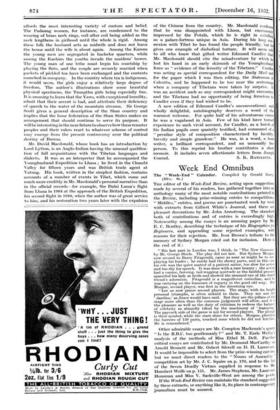Burma and Tibet
Youth and the East. By Edmund Candler. (Blackwood. 7s. Od. ) SIR GEORGE Scores knowledge of the peoples inhabiting the further regions of Burma is no less remarkable in its scope and detail than that upon which he has drawn in his books on the Burmese properly so-called. There can be no authority on the Asiatic races who carries his learning more easily, and in this book he has a fascinating subject. " A ragbag of races " is the phrase he uses in relation to one part of the large territory over which he roams. It might be taken as a summary description of the whole, for we have here an extraordinary congeries of peoples, some- times not living in their own districts but elaborately inter- laced while keeping separate from one another. The veneer of Buddhism is very thin ; all the peoples of this division of Asia, Sir George Scott remarks, are to be classed as animists. As always it is the web of domestic tradition that affords the most interesting variety of custom and belief. The Padaung women, for instance, are condemned to the wearing of brass neck rings, coil after coil being added as the neck lengthens in girlhood until the whole is rigid. Among these folk the husband acts as midwife and does not leave the house until the wife is about again. Among the Karens the young men are segregated in bachelor quarters, while among the Kachins the youths invade the maidens' bower. The young man of one tribe must begin his courtship by playing the flute, and the couple are securely married when packets of pickled tea have been exchanged and the contents munched in company. In the country where tea is indigenous, it would seem, the girls enjoy a relatively large degree of freedom. The author's illustrations show some beautiful physical specimens, the Taungthu girls being especially fine. It is amusing to learn that the Yaws, with exceptional humility, admit that their accent is bad, and attribute their deficiency of speech to the water of the mountain streams. Sir George Scott gives a general description of the Shan country and implies that the loose federation of the Shan States makes an arrangement that should continue to serve its purpose. It will be interesting in the near future to observe how these remoter peoples and their rulers react to whatever scheme of control may emerge from the present controversy over the political destiny of Burma.
Mr. David Macdonald, whose book has an introduction by Lord Lytton, is an Anglo-Indian having the unusual qualifica- tion of full acquaintance with the Tibetan languages and dialects. It was as an interpreter that he accompanied the Younghusband Expedition to Lhasa ; he lived in the Chumbi Valley for fifteen years and was British trade agent at Yatung. His book, written in the simplest fashion, contains accounts of a number of events in Tibet, which come out much more credibly in Mr. Macdonald's personal narrative than in the official records—for example, the Dalai Lama's flight from Lhasa in 1904 at the approach of the British Expedition, his second flight in 1910, when the author was of great service to him, and his restoration two years later with the expulsion
of the Chinese from the country. Mr. Macdonald confesses that he was disappointed with Lhasa, but enormously impressed by the Potalit, which he is right in extolling as a palace-fortress unique in Asia. During his long can. nexion with Tibet he has found the people friendly, but he gives one example of diabolical torture. It will seem odd to all who knew that gifted writer Edmund Candler that Mr. Macdonald should cite the misadventure by which he lost his hand in an early skirmish of the Younghusband force as " evidence of the ferocity of the Tibetans." Candle was acting as special correspondent for the Daily Mail and for the paper which I was then editing, the Statesman of Calcutta, and he happened to be too near the scrimmage when a company of Tibetans were taken by surprise. It was an accident such as any correspondent might encounter, and the Tibetans had no opportunity of being ferocious to Candler even if they had wished to be.
A new edition of Edmund Candler's unconventional, and wholly delightful, autobiography deserves a word of the warmest welcome. For quite half of his adventurous career he was a vagabond in Asia. Few of his kind have turned experience to such vivid account, for Candler, as a batch of his Indian pupils once quaintly testified, had command of a peculiar style of composition characterized by lucidity, brevity and simple grandeur." He was, in a word, a born writer, a brilliant correspondent, and an unusually fine person. To this reprint his brother contributes a short memoir. It includes seven affectionate letters from Joseph































 Previous page
Previous page